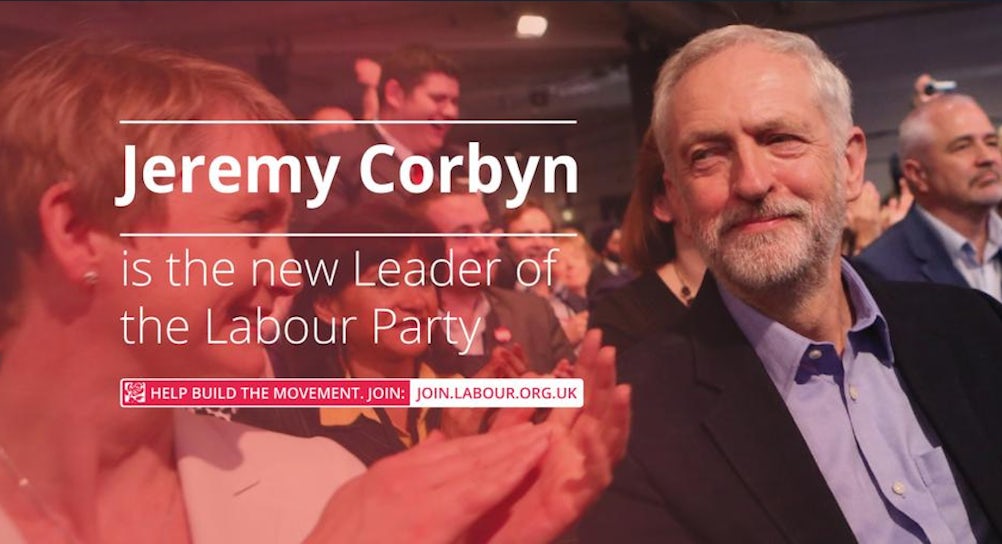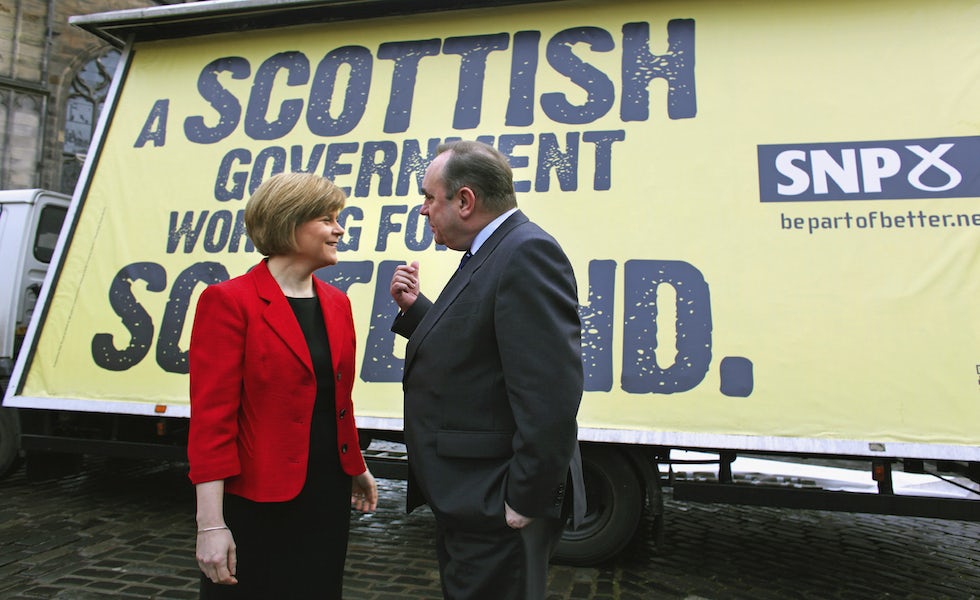How Brexit has impacted the brand health of the UK’s political parties
Political marketing experts voice their opinion.

Voting in a UK Election. Coloured Rosettes for the principal UK political parties
The Conservatives’ challenges
Establishing Britain’s future in the EU divided the Tory party, with Prime Minister David Cameron and Chancellor George Osborne locking horns against the likes of Michael Gove and Boris Johnson. But after the latter’s Leave camp came out on top, Cameron was forced to resign with Theresa May set to replace him as Prime Minister on Wednesday (13 July).
Moray MacLennan, worldwide CEO at M&C Saatchi, built the marketing campaigns for the Conservatives at the General Election and also drove the Remain campaign strategy.
“The big problem we had is referendums are uniquely different,” he admits. “You need clarity and single mindedness for a political marketing strategy to work but when you have cross party partnerships it is hard to be focused. In the General Election we really cut through with the stuff around [former Labour leader Ed] Milliband being in the pocket of the SNP and there wasn’t an equivalent moment.
He adds: “Both campaigns were fairly dismal. It was obvious that we needed to get all the young people involved but if we look at the financing of both camps and parties, I think the parties barely spent anything. There was no proper data targeting involved.”
MacLennan believes it would be “extraordinarily optimistic” to say the Tories were now in a better place than pre-Brexit. However, he expects them to bounce back quickly.

“[Brexit] has been the issue that has split the party for the last 30 years. At some point in the next two years it will finally be off the table, the scars will heal and the Tories will be stronger for it.”
As the former chairman of the London Conservatives, Ian Twinn, ISBA’s current director of public affairs, admits there is the “potential for a damaging impact” should the Conservatives fail to deliver on their promise for a good deal in their exit negotiations with the EU.
With the Leave camp having made promises to invest £350m a week into the NHS and to cut immigration numbers, Twinn also says whoever is made PM will face a tough task maintaining the trust of Leave voters.
“It’s all about whether the new PM delivers on all these promises. If it’s a no then that has the potential for a damaging impact,” he explains.
“Ultimately, Cameron was more appealing than the Tory party itself. People liked him as they thought he tried to get things done and spoke sincerely. It’s hard to replace that. The Remainers need to be brought back in again and that’s a serious challenge.”
Labour in turmoil

The biggest complaint levelled at Labour leader Jeremy Corbyn throughout the Brexit campaign was that he didn’t made his position clear enough. Previously, Corbyn had revealed anti-Europe sympathies yet the party’s official position was Remain.
“The big disconnect was the public didn’t see Labour particularly standing for remain. [Corbyn] didn’t passionately campaign for it. He didn’t want to come out for it completely,” explains Paul Baines, professor of political marketing at Cranfield University.
Following the decision to leave, 172 Labour MPs filed a vote of no confidence in Corbyn and Angela Eagle is mounting a leadership challenge. But despite this lack of faith, the Labour leader shows no signs of quitting and says he will sue his own party should the National Executive Commitee not put him on a new leadership ballot paper automatically.
And with economic uncertainty growing, the bitterness within the Labour party comes at a time where many of the electorate is looking for a credible opposition to the under-fire Tories.
“A lot of the general public want a strong opposition but just don’t have one right now,” replies Baines.
“If Corbyn stays and forces it to a ballot of members and wins, Labour’s fortunes will be dismal for years to come. The brand health will really tumble.”
Paul Baines, professor of political marketing, Cranfield University
He adds: “It needs a strong leader that can crossover not just with the far left but the working classes lost to the Tories and UKIP. If it doesn’t then it will be in the wilderness in same way it was in the 1980s. The big problem is who is that new leader? Angela Eagle could do even more damage.”
One advertising executive that used to work closely with Labour says the party needs to change its entire approach to marketing. “From our experience working with Labour, they’ve become incredibly risk averse and reverted to traditional communications like a throwback to the 80s. It’s now all about not trying to lose opposed to trying to win.”
He explains further: “At Labour they created the 35% strategy. They’ve done all the maths to say if they scrape by with 35% of the vote then that’s enough. That is the mentality rather than to be dominant.”
He says the party is “completely broken from top to bottom” and that Corbyn is “anti-marketing” as he considers it to be “all spin”. “Labour used to treat ad agencies as their trusted advisors but not anymore,” he adds. “But marketing is the least of their concerns. They need a new leader with mass appeal and fast.”
UKIP’s uncertain future

You could argue that UKIP were one of the greatest beneficiaries of the Brexit outcome. Having dedicated his political career to campaigning to leave the EU, UKIP leader Nigel Farage had a grin like a Cheshire cat when addressing the European parliament immediately following the Leave victory.
However, with Farage stepping down, some believe the party could stray into irrelevancy.
M&C Saatchi’s MacLennan explains: “As a party, they might have served their purpose now Farage has gone. But what happens to UKIP now depends on how well the other parties shape up.
“If Labour introduces a strong new leader and the Tories too, I think it will squeeze UKIP out and the Lib Dems too. We will go back to a two party drive.”
Moray MacLennan, worldwide CEO, M&C Saatchi
Although it only secured one seat in the House of Commons, UKIP came third in terms of votes with 12.6% at the 2015 General Election.
And, despite Farage’s departure, ISBA’s Twinn says it would be wrong to discredit the party too quickly.
He warns: “Yes, there are some question marks around UKIP, but there is still a strong UKIP contingent and they represent real concerns. The big mistake Cameron made was being rude about Ukippers too early. Whoever comes in cannot discredit them but must engage even if their views are not aligned. The wave that led to UKIP isn’t going to just vanish.”
The political winners?

One thing people seem to agree on is that the Brexit fallout has benefitted the SNP. Following the decision to leave the EU, its leader Nicola Sturgeon said a second Scottish referendum is now “very likely”. A source told us that while “everyone else was fighting”, Sturgeon spend the immediate days after the referendum results meeting with her cabinet. “Even if you don’t like her politics she has showed very strong leadership.”
Baines, meanwhile, believes Sturgeon is the only political leader to come out of Brexit “without any scars.” He adds: “Ultimately, 62% of Scots backed the decision to Remain. She did her job brilliantly. What does that say about Cameron and Corbyn?”
With just eight MPs remaining in the House of Commons, the Liberal Democrats’ political voice isn’t what it once was.
But leader Tim Farron is hoping its post-Brexit promise to take Britain back into the EU can restore support. He claims the party has seen thousands of new members as a result of the pledge, with one joining every minute.
Twinn isn’t convinced: “I’m not sure what the Lib Dems can do as they are swamped out. After the tuition fee pledges, I’m not sure many people will believe them anymore.”
However, an advertising source told us the result give the Lib Dems a “reason to exist”. “The Lib Dems will profit as this gives them a reason for being. It gives them a point of view at a time where both Labour and the Tories are in complete disarray.”
Trust in MPs
Many have claimed the 52% of Brits that voted Leave were proof of distrust in the establishment. Londoners voted overwhelmingly in favour to stay in the EU but this bubble did not extend to outside the capital.
Twinn, a former MEP, says trust now needs to be rebuilt in politics as a whole.
“People voted leave as a result of a lack of faith in politicians. I find that worrying. People don’t believe in us.”
Ian Twinn, director of public affairs, ISBA
“When you ask people about politicians as a whole they say they are out of touch. But if you ask them about their own local MP, they saw they are lovely.”
A big reason behind the distrust is the hate that has crept into UK politics, according to professor Baines. He says it is something more in-line with the US.
He adds: “The Leave campaign was like propaganda and it came out with a very harsh interpretation of any kind of truth and felt a little racist.
“If negative campaigning is done badly it can create a backlash effect and we are seeing that right now. British politics has become a very spiteful place and when hate is high, it doesn’t necessarily create trust.”
Read more: General Election 2015: confronting the trust issue
MacLennan agrees with Baines’ assessment and says in order to restore faith in MPs and politics as a whole, whoever is in power must address the public’s concerns
He concludes: “The wake-up call to politicians is the extent of the anger among the US and UK populations. They feel they’ve not benefited from globalisation and the share of wealth. Their countries are richer but the general public is not. The Western World needs to realise that and address it before it leads to even bigger social problems.”






